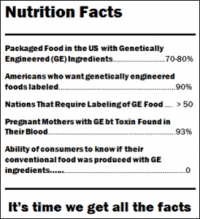
The following is a blog post authored by Frank Plughoff of the Committee for The Right to Know.
The “who” are large Biotech and Agrochemical companies. The “what” are genetically modified organisms (GMOs).
Most simply defined, genetically modified organisms are living things, plant or animal, which have had their DNA artificially altered in a laboratory for commercial purposes. This alteration is usually done by the addition of genes from completely different plants, animals, viruses, or bacteria. The result is a new organism that exhibits unique “traits”, such as resistance to herbicides or the production of pesticides in every cell of the new organism.
Today it is estimated that around 80% of processed foods contain GMOs. Approximately 86% of the corn used in processed foods in the U.S. is genetically engineered. This corn is regulated by the Environmental Protection Agency not as an agricultural crop, but as a pesticide. The other major GMO crops are soy, cotton and canola. There are a few minor crops as well. But these major crops, and their products, are added to our food supply in the forms of oils, sweeteners, amino acids, aspartame, vitamin C, flavoring (natural & artificial), maltodextrin and so on…
Why is this a concern? There is a great deal of evidence that there are a myriad of health issues associated with eating GMOs. This evidence is readily available in publications such as, GM Crops – Just the Science. Unfortunately, the science is not yet definitive, as science funded by Biotech and Agrochemical companies aggressively refutes any findings that point to the unfavorable aspects of GMOs. We now find ourselves in an epic argument with a financially powerful and politically connected Industry that continues to say, “my science can beat up your science.”
The concerns go far beyond the uncertainties of the potential, direct health risks. The consequences of genetically altering our food supply have global and long-term implications to our environment, biodiversity, food sovereignty, governmental regulatory and policy practices, corporate ethics and corporate dominance, indigenous foods/heritage seeds and a huge variety of other issues.
One of the most disturbing aspects of genetically engineering of food in the U.S. is that we are being denied the right to know and to choose. In over 50 other countries, GMOs are either banned completely or they are required to be labeled. For whatever reason a person may choose to either buy or not buy a genetically modified food, yet in this country we have no right to make that choice. We lack that right because Industry, with its undue influence on our regulatory bodies, has pressured those bodies to ensure that the products are not labeled out of the fear of loss of sales. And so the experiment goes on where an untested and unproven technology is foisted upon the consumers of this country without their knowledge or consent.
“We have learned from painful experience that anyone entering an experiment should give informed consent. That means at the very least food should be labeled if it contains GMOs so we each can make that choice.”—David Suzuki, scientist/geneticist
So what are we to do when powerful corporations seem to have a stranglehold on our legislative and regulatory bodies? Such a hold that those policymakers and agencies refuse to even entertain any suggestion of reigning in GMOs, or at the very least, labeling them. What do we do? We exercise our rights!
The Committee for the Right to Know is a grassroots, wide-ranging coalition of consumer, public health and environmental organizations, food companies, and individuals dedicated to labeling GMOs in California. On November 9, 2011 the Coalition submitted the initiative California Right to Know Genetically Engineered Food Act to the State Attorney General.Signature gathering will begin on February 17 in order to get this action to Californian voters for the November 2012 election.
In order to qualify for the ballot 550,000 valid signatures need to be collected. There are about 10 weeks until the deadline of April 22nd in which to gather 850,000 signatures, giving the initiative a buffer to ensure that it qualifies for the ballot. This is seemingly a monumental task, but absolutely achievable with enough support.
Your help is needed!
The Committee for the Right to Know is seeking organizations to partner with us, to rally their members to join their effort to gather signatures for this important and historic action.
This is the time to stand up and say, “We have the RIGHT to KNOW what’s in our food.” Please join in the movement.
For further information please go to www.labelgmos.org/
Find an event or signature training near you www.labelgmos.org/events
To endorse the campaign please visit http://carighttoknow.org/joincoalition


